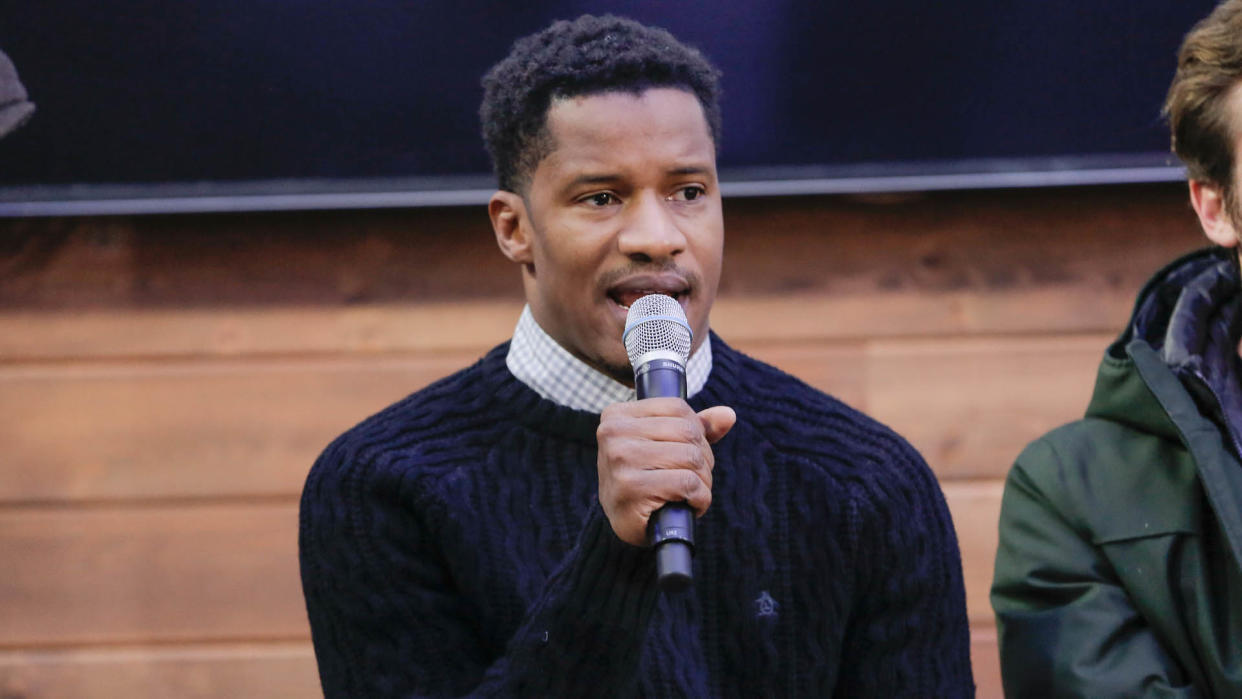Nate Parker Gets Warm Reception at Virginia ‘Birth of a Nation’ Appearance

Norfolk, Va. — Nate Parker got a rapturous reception on Tuesday at Norfolk State University, a historically black college half a mile from the housing project where he lived during his early years.
“I’m home,” he told the packed theater, to a huge ovation.
The appearance was “The Birth of a Nation” director’s first on a college campus since controversy erupted last month over his acquittal on rape charges 17 years ago.
Parker did not mention the controversy, nor was he asked about it. Instead, he stuck to the themes of the film. The audience of about 350 people — almost entirely African-American — greeted him like a returning hero.
He had a confession, he said. The first time he was on the campus he was three years old in campus care as his mother, Carolyn, attended classes. But not for long. “I actually got kicked out,” he said. “I think it was for biting.”
Parker’s appearance followed by the private screening in a nearby multiplex of “The Birth of a Nation.” He co-wrote, stars, and directs the film about the 1931 slave rebellion led by Nat Turner that left 60 whites dead and as many as 200 slaves and free blacks killed in retaliation. Turner was hanged, beheaded and skinned.
At his first college promotion appearance, he stressed his desire that the film would be a catalyst for healing and change. “My art is a function of my activism,” he told the students.
Even before he was an actor, Parker said, Nat Turner was his hero, describing him as a Braveheart for the black community. “When I had the potential to become a filmmaker I knew his story was something I could pull everything I wanted into,” he said, adding that growing up he had no idea slaves fought for their freedom and were not just given it.
For Parker, Turner’s story changes the narrative of history. It’s important to know slaves resisted from the time they were put into the bottom of a ship, he said. Turner’s rebels were willing to fight, even with only axes and tools. They poisoned their owners. They destroyed crops.
“Resistance is essential in the fight for freedom,” he said, adding that he was not advocating violence.
He wants the film to help people better understand the complexity of racism. “How are you going to use that Nat Turner-inspired ideology to resist and create some change in this country?” he asked students. “You can do it.”
Since it won the Audience Award and Grand Jury Prizes earlier this year at the Sundance Film Festival and sold for $17.5 million in a rights distribution deal to Fox Searchlight, the movie has been the darling of critics and ignited early awards talk. But promotion for the film, which reaches theaters next month, slowed after the old rape case against Parker resurfaced and it emerged the woman had later committed suicide.
Parker, then a scholarship wrestler at Penn State University, and a roommate were charged with raping a drunken 18-year-old woman. Parker was acquitted. His roommate — Jean Celestin, the co-writer of the film — was convicted, but freed on appeal.
Parker, who has discussed the rape in recent weeks, was not asked about it during a short question-and-answer session with pre-screened questions.
In the movie, the rape of Turner’s wife, Cherry, incites the revolt. But that’s not historically accurate, according to Cassandra Newby-Alexander, a professor of history at Norfolk State and one of those who introduced Parker.
Turner said he wrote the film with 2016 in mind. The first police officers, he noted, were slave catchers. “People wonder why we have a fractured relationship with law enforcement,” he added.
His film intentionally bears the same title as the racist 1915 “Birth of a Nation” that reinvigorated the Ku Klux Klan. He urged students to tell the stories of their ancestors, stories like those of Nat Turner and others who revolted against slavery. He referred to the Bible’s admonition that a good man leaves an inheritance for the children of his children.
“We have to assert ourselves so we are part of the solution, not part of the problem. We have the power to tell stories,” he said. “We have the power to correct revisionist history. We have the power to pass that on to our children.”
After the talk, attendees stood in a long line to take selfies with Parker.
Related stories
Difficult Chapter, Tough Choices for Oscar Voters
Fox Searchlight Launches Voter Registration Drive for 'Birth of a Nation' Screenings
'Birth of a Nation' and 'Girl on the Train' Hit Box Office Tracking: How Will They Fare?
Get more from Variety and Variety411: Follow us on Twitter, Facebook, Newsletter
